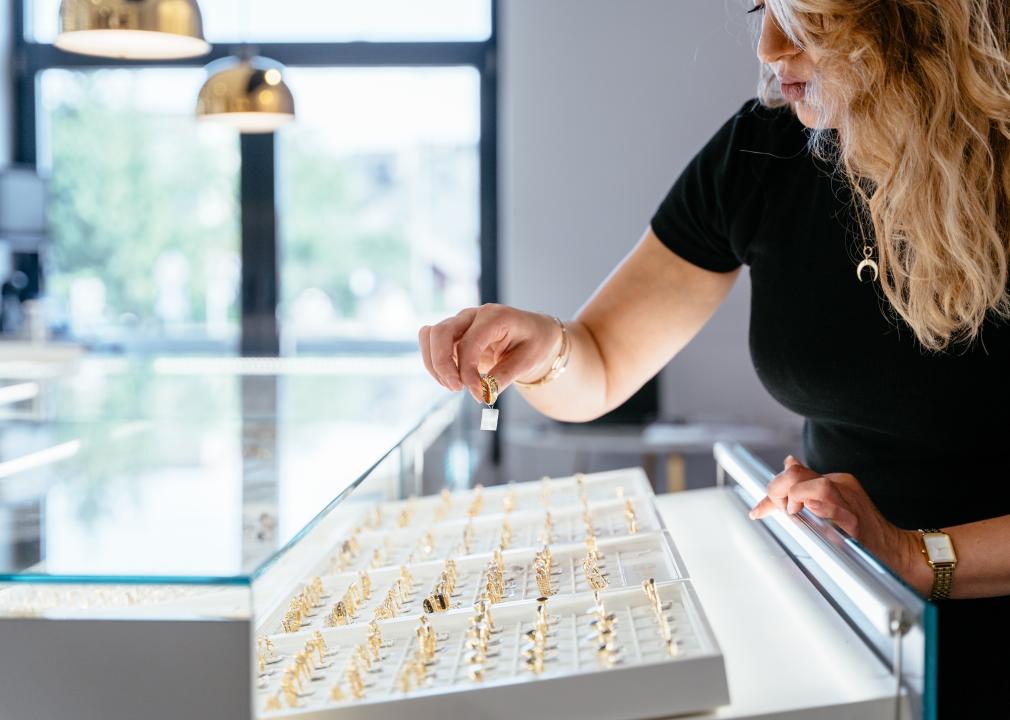Dragon Images // Getty Images Gone are the days of hopping from one jewelry store to the next to look for your dream engagement ring or that perfect necklace for someone special. As faster delivery and better product visualizations elevate the online shopping experience, consumers have become increasingly comfortable making big-ticket purchases like jewelry online. Retailers and manufacturers may be feeling the pinch of rising gold prices, which surged this spring and were up 16.5% year on year as of April. Despite greater comfort with making big-ticket purchases online–not to mention the return of trends like gold hoop earrings–price is a sticking point for many consumers. Jewel360 compiled a list of ways retailers and vendors are embracing technology to boost jewelry sales. To maintain online sales, jewelry manufacturers need to watch overhead costs like marketing, distribution, and production, Larry Rickert, owner of Jim Kryshak Jewelers, told JCK magazine. One way to reduce overhead and attract new clientele is by leveraging digital features to create customized user experiences. For those who love bling and baubles, there are more online options than ever. E-commerce sales are taking an ever-growing share of total U.S. retail sales, and jewelry is no exception. The U.S. Census Bureau reports that just under 16% of all retail sale transactions were made online in the first quarter of 2024, compared to about 7% in 2005. Online jewelry sales are particularly strong during the holiday season, with rings, earrings, necklaces, and other adornments among the top-selling gifts on Cyber Monday in 2023–Cyber Monday online sales were 99% higher than an average day the prior month, according to an Adobe e-commerce industry report. The industry benefited from this boost after a pandemic-era decline in jewelry and watch sales. However, the market plateaued in 2023, and forecasts are mixed for 2024, with some top online retailers predicting a downturn in e-commerce sales. In a 2021 McKinsey report about the future of the fine jewelry and watches industry, analysts predict sustainability will be key moving forward and could influence 20 to 30% of fine jewelry sales by 2025–tripling from 2019 numbers. Continue reading for five ways jewelry businesses are evolving as consumers increasingly shop online. Design with artificial intelligence antoniodiaz // Getty Images Artificial intelligence tools are everywhere, and several jewelry innovators have already incorporated them into their processes. While AI might conjure number-crunching and market analysis, creative approaches are endless. Nick Koss of Volund Jewelry has been using AI to create personalized jewelry since 2015. He told Rapaport he prompts AI with an ideal visual outcome and allows it to generate multiple solutions, resulting in “novel and unforeseen designs.” Try it out for size with augmented reality Iryna Inshyna // Getty Images Online shopping simply can’t recreate the feel of trying an item on in real life–but with augmented reality, it comes close. AR technology can scale and position a piece of jewelry in real time, showing buyers exactly how a ring will look on their finger, Olivier Reza, chief executive of his family’s atelier, explained to The New York Times. Reza built a catalog of virtual items for customers to “try on” via their smartphone; 20- and 30-somethings are particularly willing to purchase items entirely online. Seek out trends with visual search Iryna Inshyna // Getty Images Some consumers may catch a glimpse of a product they love on a colleague’s hand or around the neck of their favorite influencer, but without knowing the name or the designer, finding that same item can be challenging. That’s where visual search shines. Customers can take a photo or screenshot and then upload the image to a search engine to find similar items. “As online stores multiply, e-commerce businessmen are seeking ways to outshine their competitors,” Kam Star, the VP of product portfolio at SS&C Blue Prism, told AI Magazine. “Visual search is one option. By presenting similar results based on an uploaded image, the technology massively simplifies the search process.” Use software for inventory replenishment Iryna Inshyna // Getty Images Technology can also act as a secret weapon in the supply chain management team, issuing an alert when stock is low or predicting sales trends ahead of the holiday rush. Retailers can look for inventory replenishment software that takes the guesswork out of restocking and ensures products are always available to meet demand. Offer data-driven personalized recommendations Iryna Inshyna // Getty Images Jewelry is among the most personal items a consumer can buy. A signature necklace worn daily says something about a customer’s personality and style, and a jewelry gift can set the tone of a relationship. Technology can help with that, too. Website data can be leveraged to offer suggested products similar to those the user has viewed, and browser data can help serve up ads to attract new customers looking for a new piece of jewelry. Story editing by Alizah Salario. Additional editing by Kelly Glass. Copy editing by Kristen Wegrzyn. Photo selection by Clarese Moller. This story originally appeared on Jewel360 and was produced and distributed in partnership with Stacker Studio.
As gold prices fluctuate, here's how jewelers are using technology to attract new shoppers online












